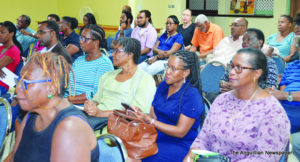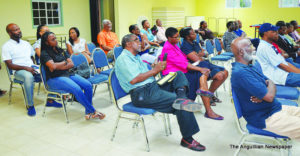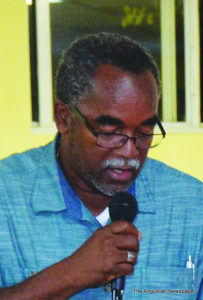
Dr. Wycliffe Fahie, Dr. Phyllis Fleming-Banks, Ms. Jansie Webster
and Mr. Bren Romney
A panel discussion on the history and future of small-business environment in Anguilla, organized by the University of the West Indies Open Campus, was held at the basement of the Church of God (Holiness) on the evening of Thursday April 19th.
In essence, the discussion which was open to the general public, was pitched as a Community Engagement Session under the Anguilla Country Conference program of the University. The focus was on small and medium-size enterprises known as SME’s with the theme: “A Dying breed or an Emerging force; the future of Small Business in Anguilla”. Great insight was shared and thought-provoking considerations were stirred by the presentations.
The moderator was Ms. Nakishma Rogers-Hull and the facilitators were Dr. Wycliffe Fahie, Economist and Principal Assistant Secretary Finance, and Mr. Bren Romney, Director of Youth and Culture. Both men sought to describe a landscape that showed the evolution of small-business trends on the island from as far back as 1945 (post World War II) to current.
 Such trends encompassed the nature of every past small-business: from the successful operations of small-scale home-run neighborhood suppliers, to counter-top grocery shops that sold liquor by retail, to the main depot of staple products known to many as The Factory, owned by C.R. Rey and Company Ltd., and operated by the then renowned Joe Owen. The key concern was on how present-day small businesses would be expected to thrive in an environment of adverse economic climate, a meager population base, competition, and overall dwindling local market activities.
Such trends encompassed the nature of every past small-business: from the successful operations of small-scale home-run neighborhood suppliers, to counter-top grocery shops that sold liquor by retail, to the main depot of staple products known to many as The Factory, owned by C.R. Rey and Company Ltd., and operated by the then renowned Joe Owen. The key concern was on how present-day small businesses would be expected to thrive in an environment of adverse economic climate, a meager population base, competition, and overall dwindling local market activities.
As part of his deliberation, Mr. Fahie noted: “When studying the 1967 Anguilla Revolution, we cannot just think about the revolution in isolation. It was not just a matter of separating from the State of St. Kitts Nevis and Anguilla, but the reason behind the separation was that Anguillians desired a better life with a better economic outlook. Back in those days, Anguilla was hardly an economy — but you did the best you could. We were just a step up from a subsistence economy, and the way we know the economy today, that was not what it was.
“In trying to define small business in Anguilla, we came up with the view that ‘small’ in a big country context would be somewhat large here. Therefore, we concluded that in the Anguilla context, between 1945 and 1967, ‘small’ meant every business venture outside of C.R. Rey Company Ltd. — The Factory.

“Historically, in Anguilla back then, small business included the work of fishermen, tradesmen, a doctor who worked for government (but who carried out a limited private practice) a couple mechanics, two blacksmiths, and a shoemaker. There was also a soft-drink factory which was basically an arm of C.R. Rey Company Ltd.
“Then, there were the peddlers — persons who walked the length and breadth of the island selling small commodities from door to door on foot or on bicycle. In addition, small business also included those persons who would sell goods from their homes, including the sale of rum from demijohns. But more commonly, during that era, there were the little roadside grocery shops, which dotted the landscape all across the island, selling liquor and non-perishable staple products.

“In the mid-50’s to early 60’s and beyond, we experienced a change in business dynamics when customers began to demand more, as tastes got a little more ‘modern’. Now as we became more ‘sophisticated’ we began to move away from the mundane business of earlier days which only focused on the staples. The importance of The Factory began to decline as business owners began to become more independent.
“In Puerto Rico, there was a trade and commerce operation called ‘Operation Boot Straps’ which helped to spark business development for countries in the Eastern Caribbean. Fledgling Anguillian businesses bought into that trade which began to enhance the quality of business here, and the spirit of the entrepreneur began to take over business owners.
“Soon, women became more prominent in business, just as they were significant in the revolution. Such women were the likes of Mathilda in North Side, Delphine in South Valley, Jessie in Stoney Ground, Miss Birdie in Sandy Ground, and Mildred in East End. Then, there were returning Anguillians who came back to take advantage of the opportunity of doing business in an era when they thought Anguilla needed their contributions in business.
“These entrepreneurs came back to open shops, and the names which they gave to their shops reflected the places to which they had migrated. Shops like Caracasbaai Grocery, owned by the late Watkin Hodge, sprang from Curacao. And Esso Brazil, the origin of Proctors, came out of Aruba.”

The Other facilitator of the discussion, Mr. Bren Romney, focused mainly on thriving modern small businesses in Anguilla. He shared what the Department of Youth and Culture was doing to assist potential young business owners with getting their businesses started. He mentioned that DYC organizes business education courses and the provision of capital to assist them in making progress in their business pursuits.
A series of questions from the audience was asked and comments were made which provided for fruitful and worthwhile discussion on the future of small business establishments in Anguilla.








